Photo

Interview: Hazel English
Dream Pop’s latest darling, Hazel English, is sure to have Charlie’s swaying tonight. Behind bubbly melodies and upbeat guitars on her debut, “Never Going Home,” are her trials and tribulations with life, love, and moving across the world.
She’s originally from Australia, but moved to California to study abroad. Now she’s based out of Oakland and, according to the record’s title, she’s happy here. After a chance encounter with Day Wave, he produced the debut and aided the shaping of her breezy sound.
English will be paired with the synthy indie folk of Norfolk-based Cyborg Justice and the groovy post-punk of Richmond’s Camp Howard. Alt Daily caught up with English via email to dive a little deeper into leaving home, finding a new one, and what drove her here.
When did you move to the U.S. & What lead you to choose California to study abroad oppose to other countries?
I had visited San Francisco when I was 21 while doing some travelling and I felt a very strong connection unlike anything I’d felt before; I kind of had this intuitive feeling that I was going to live there one day. The opportunity came for me to study abroad about 4 years ago and I ended up getting into a school in the Bay Area. It was such a gut instinct thing—there was definitely a lot of doubt but something in me just knew I had to do it. It was very scary because I didn’t know anybody and I left behind a lot of comfortable things, but looking back, I can easily say it was the best decision I’ve ever made.
What have been some of the pros and cons of starting your career so far away from your hometown?
The obvious con is being away from my friends and family back home but I’ve been fortunate enough to make lots of new friends in the U.S. which has been really nice. One pro I've found is that being in a new environment often pushes you to be more open and try new things so I think that can definitely help in any artistic endeavour.
How is the Australian music scene compared to America?
Honestly there isn’t a huge difference other than the fact that there is a much bigger music industry in the U.S. Over here, I feel like there are lots of different paths you can take with it whereas back home, there is much more of a direct and narrow route to success. That being said there are some amazing Australian bands doing really well right now and I feel like people are finally starting to notice that there are a lot of talented Aussie musicians.
When did you make the transition from playing tuba in the high school band to writing your own dreampoppy music?
I stopped playing the euphonium when I reached grade 7 so there’s been quite a few years in between for me to experiment with my sound. Sometimes I think about picking it up again after all this time, I am not sure I’d even remember how to play.
youtube
You studied Creative Writing, what drove you towards that major? Any other writing you do besides songs?
I’ve always been very interested in writing and creating stories. I do write fiction too, but right now I’m pretty devoted to songwriting so that takes up most of my attention.
What are some songwriters you pull lyrical influences from?
I really love Morrissey’s lyrics because they are witty and make me laugh, although I don’t think that’s my style of writing at all. Honestly I’m probably more influenced by confessional poets like Anne Sexton and Sylvia Plath than other songwriters but I can definitely appreciate good lyrics.
11 notes
·
View notes
Photo

2 notes
·
View notes
Photo
Young Black Panthers in New Haven, Connecticut. 1970
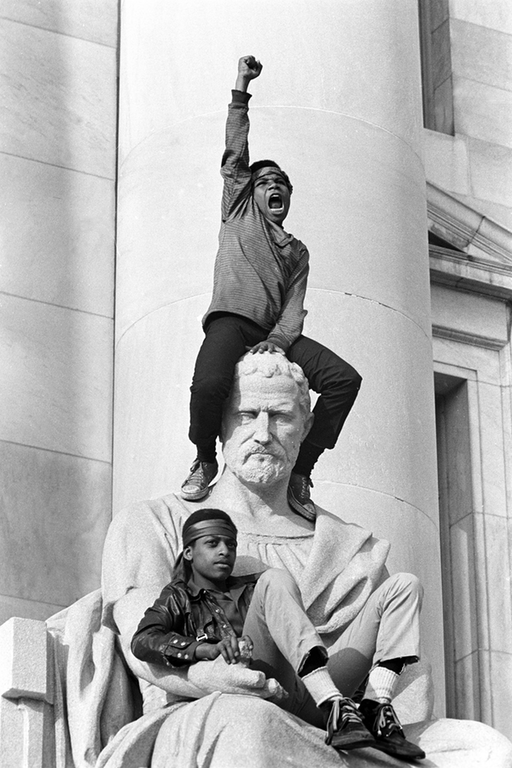
18K notes
·
View notes
Photo

“I was just a year old when my family came from Ecuador. My parents were always open with me about it. Even from a young age. I was lucky that way– a lot of undocumented kids don’t find out the truth until they’re much older. Their parents never tell them because they want them to feel normal. So the kids grow up thinking that they’re 100 percent American. Then they try to study abroad, or apply to colleges, and they find out they don’t have the papers. And it hits them hard. It’s like they’ve got to figure themselves out all over again. They learn that they aren’t a part of the culture they grew up in. And they start to feel a sense of shame. Nobody ever talks about it. They’re too afraid. I certainly never told anyone. That’s why DACA was so interesting. It gave us the smallest amount of safety. People started to step out of the shadows, and say ‘I’m here.’ We began to find each other. Now there’s a community. And we’re speaking out together. We grew up in this culture. We grew up with the same kids as everyone else. This is our home.”
4K notes
·
View notes
Photo
@madmenintegrated is flawless, and this GIF in particular perfectly sums up the bane of my media trajectory....

142 notes
·
View notes
Video
youtube
Backwards cover of Radiohead’s “Daydreaming”
Reddit user zee_d3veel is really fuckin’ with us with this one. Not only did he learn the whole song the opposite way, each line is also sung backward. It’s a downright eerie effect, yet almost unnoticeable due to the spot-on execution.
If Thom Yorke and the gang made a tour stop to the Black Lodge, it might sound a little like this. The reverse noise makes the song more jaunting than the original, sending listeners into a daze of how talented Radiohead’s fanbase can be.
5 notes
·
View notes
Photo


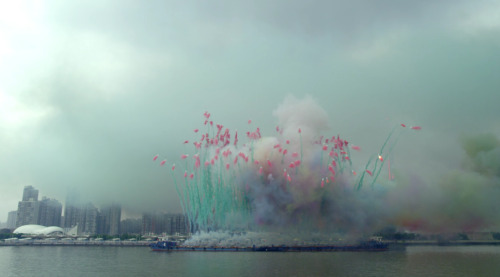
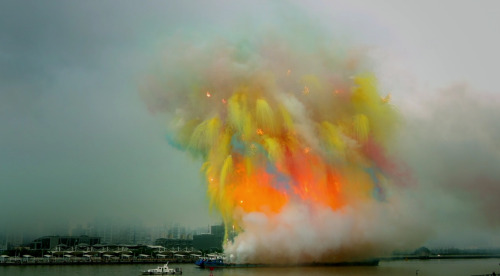
Stills from “Sky Ladder: The Art of Cai Guo-Qiang”
This amazing work by the Chinese artist utilizes fireworks to commentate on smog and depleting environmental health of China. In “Elegy,” vibrant colors represent nature that once was, while dark blacks and blues flood the skies like bruises humanity has beaten into the ozone. Ending with a slime green explosion, the toxic-looking smoke lingers in the air, hyperbolizing current conditions to show what could be. Watch the event in its entirety here.
After controversial, publicized displays that were government sanctioned such as the Olympics, Guo-Qiang's took the time to focus on what he values in art, taking on his most personal project. A dream over two decades in the making, “Sky Ladder” documents the pitfalls and execution of a 1,650-foot-tall firecracker ladder to the sky. After failures at several public sites over the years, the pinnacle of Guo-Qiang’s career was carried out in secret a fishing village before dawn. It was “to connect the Earth to the universe,” the artist said in 1994 before his first unsuccessful attempt.
Dedicated to his grandmother, the climbing work is a whimsical site, and the journey just as incredible. Chronicling the artist’s works, the doc is full of fantastic firework displays and museum installations just as gigantic.
4 notes
·
View notes
Photo
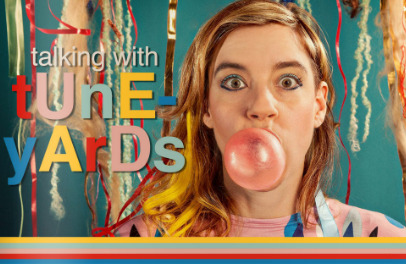
TBT: Interview with Merrill Garbus of Tune-Yards
I was lucky enough to meet @tuneyards at the Future of Music conference in 2015, and she was gracious enough to do an interview for the second issue of my online zine Crust (click to see the full issue). We talked about her activist work and the podcast she hoped to make reality in 2016. Below she discusses the idea behind C.L.A.W. featuring strictly female MCs and hip-hoppers.
---
Against a graffitied wall hundreds of miles away via webcam was Merrill Garbus, whose infectious smile took up most of my computer screen. The chatter of outside conversation, whizzing of passing cars, and faint barks of dogs could be heard behind her stream-of-conscious thought, the convolution of which she unnecessarily apologized for.
“Sorry if I’m not articulate, I’m still kind of waking up,” as the noon Oakland sun shined on her face outside of Rooz cafe. “I’m a rock star, it is first thing in the morning!” she qualified.
Garbus is the brain-child behind tUnE-yArds, the one-woman turned multi-orchestrated wonder whose musical process is as much fun to watch as it is to hear. She caught the cusp of the loop machine wave early on, which got her noticed. She’s since used her popularity as a platform for big issues, small bands, and the greater good.
Before taking the reigns of a loop machine, she was armed only with a uke and professionally wielded a puppet. During her time in college studying theater, she took a job at a non-profit puppet theater. For the theater’s puppet operas, she wrote music and played the ukulele.
Although from a folk-revived family of multi-instrumental musicians, these plays are what peaked her interest in performing. “I got into playing music that way,” she said, “I liked the songwriting better than making a puppet seem like a real life thing.”
Desire lead her to the open-mic circuit, where soon her unique soul yearned to be more than “just another chick with a ukulele,” as Garbus said. The instrument’s lacking rhythm and a suggestion from a friend lead Garbus to the Line 6 looping pedal.
“It’s a way to have a one-woman band, and at that point, I was into that,” she said.
With this, she added a new dimension to her sound, creating backing drums by recording bangs on her uke. Layers of rhythms and harmonizing vocals were laid down piece by piece live, quickly separating Garbus from her strictly acoustic counterparts. This tantalizing process skyrocketed the success of her debut album, “BiRd-BrAiNs.”
Looping got Garbus noticed by Dirty Projectors, who asked her to join them on their 2009 European tour. “Shit! I don’t have enough, I’m not loud enough,” she said about her intimidation of playing aside the band in large venues.
“I didn’t feel like I had a low end or bass frequency down,” she said, “if you don’t have some kind of low frequency, people kind of tune out.”

Garbus invited now-fiancee Nate Brenner to fill this sonic void. Although he aided with some of “BiRd-BrAiNs,” he officially became a band member after the tour, during “w h o k i l l.” Brenner helped with much of the songwriting for the sophomore record, such as “Bizness” and the single, “Gangsta.”
With Brenner’s help, Garbus was able to focus more on investigating rhythm. She said the duo made tUnE-yArDs “less of a one-woman band and more…one woman voice & rhythm stuff with his bass playing.”
Garbus’ exploration of rhythm and expansion of her band perpetrated in her latest release, “Nikki Nack.” Haitian percussion was a huge inspiration, which she studied for a year in Haiti. Drums with intersecting parts enchanted Garbus, and utilizing this on the record taught her how to dissect a song and weave voices “to make the whole sound.”
Not only had the sound developed, but so has Garbus’ message behind her lyrics. She said they lyrics in “Nikki Nack” “had to do with these things that we take for granted, and maybe not taking them for granted anymore - specifically water.” Residing in the drought-ridden state of California has made Garbus appreciate H20 in a new way, along with increasing her anxiety about the growing problem.
“The best way…to deal with fear is be proactive,” she said, and she’s succeeded in combating fears with the Water Fountain Fund. Started after the reluctant sale of the catchy “Nikki-Nack” single “Water Fountain” to SONOS, the company struck up a deal to use the song only if they began Garbus’ fund. Since then, $1 from each ticket sale has been pooled and dispersed to several organizations helping with different water-related causes.
Funding has aided in Gulf restoration, community water centers in California, and Haitian medical wells. Garbus also used some of the money to send the Haitian drum group she studied within Oakland to play in their homeland for the first time.
In an effort to stay connected to the community as her success exponentially rises, Garbus has begun producing smaller artists albums, such as San Francisco based Sunny and the Sunsets. “I just hope I’m helping them make their musical dreams come true,” she said. One of Garbus’ new year’s resolutions is to keep her ear close to the ground, hoping to reconnect with the Montreal scene where she got her start and see more local shows.
Garbus also resolves to continue drum lessons, begin vocal lessons, and release a new tUnE-yArDs album in 2016. One of her most exciting ventures for the new year is her podcast, the working title of which is “Transformers are Women.”
The podcast searches for a diversity of voices in hip-hop, focusing solely on female MCs and producers here in the U.S. and abroad. Garbus’ friend and Istanbul-based producer Grup Ses inspired the project with his compilation of Turkish female rappers against his beats. “Rapping in Turkish is fuckin’ dope!” Merrill exclaimed.
“Women rappers are so important,” said Garbus, whose time spent abroad proved to her just how far hip-hop has spanned the globe since late-70s Brooklyn. Garbus said she hopes to “bring hip-hop in different languages and different cultures…more exposure.” and spark a “global conversation of women in hip-hop and beat making through this portal.”
Since the success of “Nikki Nack,” Garbus has exercised how mainstream artists can potentially use their powers for good. Her philanthropist efforts in the past year and true love and respect of the music scene illustrate the folk ideologies her parents grew up on, exercised in the same vein as revivalist Pete Seeger. Constantly, Garbus is shifting the spotlight off of herself onto important issues and budding musicians, monopolizing on her notoriety to make others take notice.
0 notes
Video
youtube
The revolution will not be televised…
And it never was. Thanks to social media, we’ve been shoved into the driver's seat, armed with cell phones recording the revolution and all the atrocities that caused it, live. Uproars have overtaken TV screens and forced a shift of narrative that’s less cheery and doesn’t comb over unpleasantries.
Gil Scott-Heron’s 1970 poem-turned-song mentions hidden police brutality, which has only come to light through these means. With shows like “Blackish,” these social issues are finally penetrating even cheery sitcom culture, making it much harder for folks to “plug in, turn on, and cop out.”
0 notes
Photo
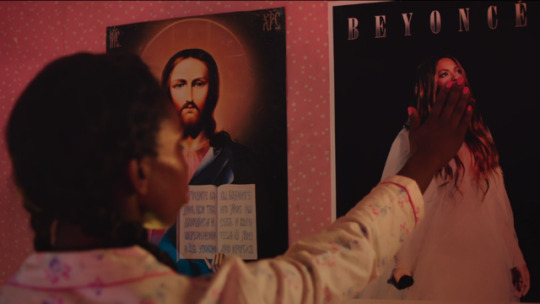
The Netflix original series Chewing Gum is killin’ me! The funny, independent and unique women are refreshingly complex characters that keep the faith in our clever and creative generation of fresh voices.
1 note
·
View note
Audio
Song Exploder featuring Grimes
Such a rad episode of a great podcast, Song Exploder. Each episode, this show takes a track by an artist and breaks them down element-by-element. I’m glad Claire Boucher, aka Grimes, chose Kill v. Main, my favorite song from 2015’s release, Art Angels.
The channeling of a Godfather and vampire action-flick fusion is exactly what I hoped Grimes went out to prove with this track. It’s her chance to tell naysayers wrong and show her edgy side while still keeping it adorable - as if the two are mutually exclusive.
0 notes
Photo

Concert Diaries: Xenia Rubinos @ Strange Matter, Dec 2016
Xenia Rubinos brought together an intimate but energetic crowd at Strange Matter at the beginning of December, her first time in Richmond ever. Rubinos and her rhythmic backup finished up the year touring on the sophomore release “Black Terry Cat,” a humble record that’s no timid sonic feat.
With this one, Rubinos said, she’s “welcoming folks into the way [she hears] music.” Sporadic melodies paired with a multitaskin’ bass slapper, tight drums, and a Moog synth create a funky, stirring stew that’s easy to dance to. The record hit top lists of several music publications, following a slew of socially conscious albums concerning race. This time around, Xenia’s efforts to improve her songwriting and use words less as noises by injecting more meaning paid off.
Reading and researching her throughout the week left me a little starstruck when I emerged into the club an hour before showtime to see her sound checking. Chemistry flowed between her and her bandmates as they tweaked their sound, and tiny bites proved this was gonna be a great show.
When the lights went down, the fog machines turned on. In a daze, Richmond native Dazeases emerged on the stage, sporting a Calvin Klein bralette, black leggings, and not much else. Her revealing clothing was a preview to her vulnerable tracks, with raw lyrics sung over the beats blasting from her iPod classic. Emptiness throughout these sounds caused an appropriated awkwardness in the crowd, allowing space for the song to breathe and resonate with the audience. Channeling the likes of fka Twigs, Dazeases subdued songs sprinkled with explicit lyrics required this room to recover from the sexy shock.
Equally subdued but slightly more sleepy was My Darling Fury. Dreamy drum machines and high notes carried the fellow Richmonders performance. The band dedicated the show to the safe spaces like this lineup that encouraged inclusion. Channeling challenges of homosexuality throughout their lyrics, My Darling Fury was in good company with the compound crowd.
More people began to filter in before Xenia went on, and while the crowd steadily stayed under 50 people, every kind of person was there. The crowd was as vibrant and vivacious as Rubinos, movers and shakers equally diverse as the Afro-Caribbean rock star. She compared her shows to a community project, providing safe spaces for all walks of life to get together and dance.
The enthusiastic audience weren’t the only ones grooving, Xenia driven by the exuberated crowd to get down. Shrill shouts of “yaaaasss” and praises of the slayin’ queen amplified her dances, accelerated her into the crowd at each track’s climax.
The bassist cut his finger on a broken string within the first few songs, but this couldn’t stop the soulful sounds. Xenia asked an audience member to fetch him a band aid, and the show went on and on, barely missing a beat. The band maintained momentum and Xenia a big smile all the way past midnight, never losing an ounce of energy.
0 notes
Audio
New Music: SZA’s “Quicksand”
She’s already captured our hearts and the charts with her debut record about heartbreak and all the complicated feelings in between. With this, it only makes sense that SZA would craft a track for the finale of HBO’s hit series, “Insecure.”
It follows the themes of her hit record, “CTRL,” and the show, constantly bouncing back between competing ideas of love. Although the show nor any SZA song comes to a complete and clear conclusion, getting all those complications out there creates a trail closer to a fairytale ending. The question still begs for all women involved, is prince charming even who they’re searching for?
The track could be pulled right off “CTRL” in terms of self-reflective lyrics about trust issues and shady men. However, the vapor-wavy, horn-driven intro and sparse fading beat toward the end shows something a little different. Possibly a preview of what’s fresh for the next SZA album? 👀
2 notes
·
View notes
Photo

Criticizing Media’s Coverage of Protests & Ideas About Political Correctness
Political correctness is often a defense of conservative American media in terms of “liberals” exercising their right to protest, calling out the ills in modern society that work in advantage for white Americans. The beloved first amendment of the Constitution is regularly cited after backlash from racist or sexist comments Fox commentators say or to defend the latest atrocity Trump spewed.
They’re safe in this defense, for whether inappropriate comments are combatted or not, their power remains the same. These events don’t conjure up troubling histories, like Confederate flags. They don’t denounce the valid concerns of a large group of people such as #AllLivesMatter. Concerns and peaceful protests about systemic issues are twisted into simple sensitivities. In turn, the PC argument is used continuously keep minorities down, perpetually dehumanizing them.
Valid societal concerns cannot be grasped by the narrow-minded, singularly-focused, white-male dominated media networks. Instead of fair coverage of the issues folks are protesting about, commentators cover the protests themselves, not looking past the means to see the ends.
Coverage undermines and neutralizes, focusing on the inconveniences and disruption instead of the discussion. Worse case, they switch to focus on those taking advantage of large groups of people to commit crimes, grouping those who are violent and steal with those who are peaceful and stand. If one googles the Ferguson protests, there is little from organizers and their demands, but instead coverage of the violence that ensued.
Instead of pointing out the obvious ills of the police, they rush to their defense, placing the blame on the overwhelmingly unarmed black men who sometimes had not even committed a crime. The focus is placed on Terence Crutcher’s possession of drugs after asking cops for help with car trouble, or how Philando Castile went about telling the officer about his legal gun after being pulled over for being a considered a robbery suspect.
Meanwhile, race-driven mass shooters are “misunderstood lone wolves” are kept alive and given Burger King when they’re hungry. Conservative media remained unbiased about the groups of gun-wielding men illegally occupying federally protected land, listing their grievances and goals, while picking apart #BlackLivesMatter and not focusing on what the movement is really about. The media defends white men’s right to a fair trial while picking apart black men’s deaths to justify lethal force.
Those in the spotlight attempt to use their platforms to shed light on the matter. Millions of white eyes are glued to their TVs every Sunday, giving celebrities like Beyonce and players like Colin Kaepernick a wide and diverse platform to comment on the ills of society, a chance to reach an audience they otherwise might not. Their voices are told to be silenced, for they are mere entertainers, that their political agenda is disturbing game day. What’s truly disturbing, what should really be bothering these Americans, is the wrongful deaths of their fellow citizens at the hands of, albeit a few seemingly poorly trained but still sufficiently armed, those who should protect and serve all.
Those that criticize the sensitivity of liberals fail to capture the irony in their own exercises of censorship. These people want to whine about political correctness when we want to discuss these atrocities to American citizens, but call a kneel during the National Anthem an “attack.” They cry political correctness at events that systematically oppress others while complaining about wars being waged on patriotism. The rhetoric of those who are supposedly champions of the first amendment has led to children in school to be forced to stand for the pledge and even dock their grade if they refuse.
Critics of Kaepernick’s protest will tell you he is unpatriotic. What’s truly unpatriotic is putting symbols of our country above the residents that reside there. What truly disrespects our military is not supporting fellow Americans who they also fought for, and not standing up for them. Soldier’s selfless acts should inspire others to be more like Kaepernick or Beyonce, whose acts initiate a conversation that should incite action. Blindly reciting this anthem and never questioning authority is the type of government our soldiers fight against, dying for our right to make America the best country in the world for every single citizen living here, not just the privileged.
Kaepernick said it best himself: “There’s a lot of racism in this country disguised as patriotism”
1 note
·
View note
Photo





Polish artists Aleksandra @waliszewska’s nasty women
1 note
·
View note

